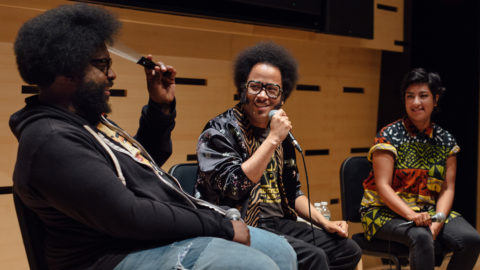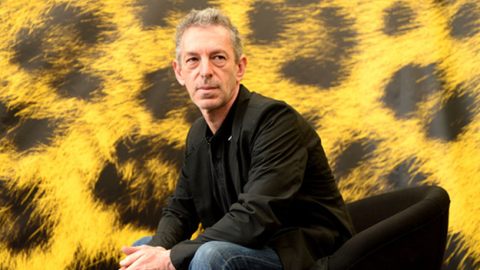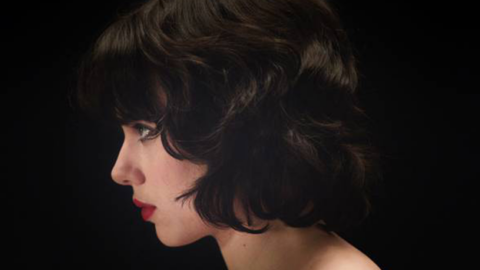News to Me: Martín Rejtman, Jonathan Glazer, Amma Asante
Martín Rejtman’s La práctica

Martín Rejtman
Four years after the release of Two Shots Fired, Martín Rejtman is in preproduction on his next feature film, a comedy called La práctica (roughly, “The Practice”). The story of an Argentinian yoga teacher who lives and works in Santiago, Chile, allows Rejtman, a key figure in the New Argentine Cinema, to explore his country’s identity against a different national backdrop.
“La prática will be my first film shot outside Argentina, with an Argentinian protagonist played by Esteban Bigliardi, but the rest of the cast is mostly Chilean,” Rejtman told Film Comment. He elaborated that the film finds Bigliardi’s character in a period of transition after a divorce.
The director was drawn to Chile for several reasons, including personal experience. “I did the sound editing and mix of Two Shots Fired there, and I lived in Santiago for over a month,” Rejtman recalled. “I had the feeling of starting a new life: I had new friends, a new social life, a bicycle. And for five years now, I’ve been going every February to a one-week Ashtanga yoga retreat at the Elqui Valley in the north of Chile.”
Rejtman attentively modulates his films’ soundscapes, which also affected his choice to set the film in his neighboring country of Chile. “In my films, the music of the dialogue is very important,” he explained. “The Spanish spoken in Chile has a very different music than the one spoken in Argentina, and this is one of the reasons why I want to shoot there.”
In a director’s statement for the film, Rejtman elaborated on how the change of scenery might open up his perspective on the story: “Every day in Buenos Aires I witness how places I’d love to include in my films are getting lost or destroyed,” he said. “A house gets demolished and a modern condo gets built, a perfect looking café from the ’50s gets modernized and ruined, and so on. In Santiago it is possible that the same phenomenon happens, but those altered locations are new to me; I have no memories of these places. I’ll approach them innocently; they won’t possess the burden of when I look at Buenos Aires’s ‘improvements,’ and that undoubtedly will influence the way I’ll film and observe it.”
While preparing for his 2019 production start date, Rejtman is also in the midst of sound editing for a comedic short film called Shakti. “It has to do with a Jewish young man, the death of his grandmother, depression, Hare Krishnas, Pesaj [Passover], and potato knishes,” Rejtman described. The main character shares his name with a concept from Hinduism, a creative power that courses through the universe.
A prolific author of narrative fiction alongside his work in film, Rejtman found it somewhat serendipitous how his various modes of writing have informed each other through the years. “I wrote the script for Shakti as if it were a short story,” Rejtman reflected. “It’s kind of funny now that I think about it, because when I started writing short stories in the late ’80s, they were like little scripts: written in the third person, present tense, a lot of action, never going inside the characters’ minds. And now I’ve written a screenplay for a short film as if it were a short story; it looks as if somehow I came full circle.”
Films on the Horizon
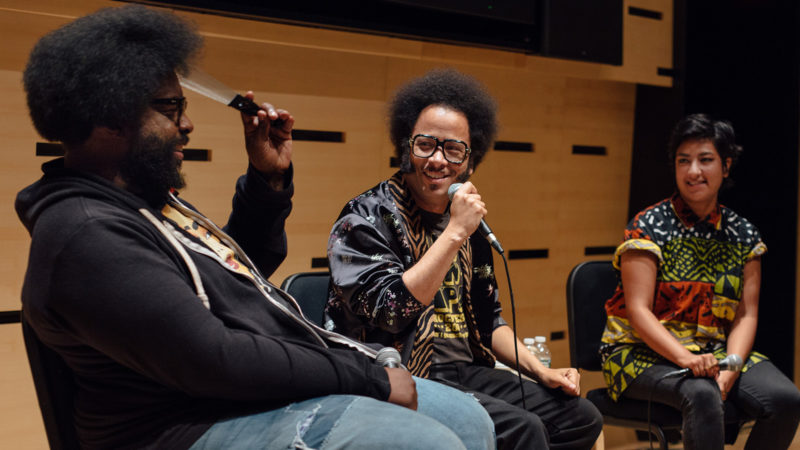
Questlove, Boots Riley, and Farihah Zaman
During last week’s Film Comment Talk (now streaming on the podcast), Boots Riley shared that he is developing at least two original projects, including one feature deal and one TV series for Michael Ellenberg’s Media Res. Although details are still under wraps, Riley quipped that, during the 20 years that he was developing Sorry to Bother You, he’s come up with “a good 20 ideas. 13 of them are good, and a bunch of those are great” . . . With her forthcoming romantic drama Where Hands Touch slated to premiere at Toronto, Amma Asante (Belle) is gearing up to direct an adaptation of David E. Hoffman’s The Billion Dollar Spy, an account of a Soviet radar expert spying for the CIA during the Cold War . . . Since the 2014 release of Under the Skin, Jonathan Glazer has been “working entirely” on a film about “the bystanders, the onlookers, the complicit” during the Holocaust, he shared on the podcast A Dash of Drash. Production will begin on the untitled drama in 2019.
Readings
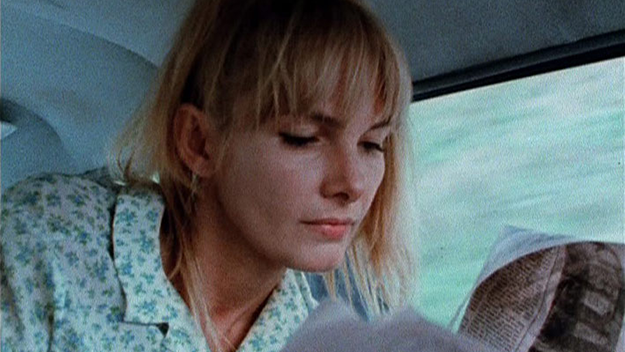
Wanda
✸ The National Film Preservation Foundation recently announced their 35 grant recipients for 2018. Selections include Gordon Quinn’s 1968 vérité film Inquiring Nuns, in which nuns conduct Rouch and Morin–style street-corner interviews in Chicago; Warrington Hudlin’s 1977 documentary Street Corner Stories, a chronicle of the daily storytelling exchanges among a group of African-Americans at a New Haven corner store; and experimental films from Stephanie Beroes and Chris Kraus.
✸ João Pedro Rodrigues sat down with Kinoscope’s Stefan Solomon to discuss two of his short films streaming on the platform: The King’s Body (2012) and Where Do You Stand Now, João Pedro Rodrigues? (2017). Read part one and part two.
✸ From Fritz Lang and Joseph Losey to Eduardo Williams and Michael Mann, Nick Pinkerton elucidates a history of surveillance in cinema for The Baffler.
✸ The Quinzaine at Cannes, newly headed by Locarno and Venice programmer Paolo Bertolin, announced its 2019 selection committee last week, reported Screen Daily.
✸ Kristin M. Jones writes on Barbara Loden’s Wanda for Frieze, on the occasion of the film’s long-overdue restoration and theatrical revival run. In Film Comment’s July/August 2017 issue, David Thomson wrote about the filmmaker and Nathalie Léger’s Suite for Barbara Loden. Elsewhere, The Frontier Experience, a short film directed by Loden and scripted by Joan Micklin Silver, is available to watch on Vimeo.
✸ Barry Jenkins’s first short, My Josephine (2003), is streaming on the director’s Vimeo channel. With cinematography by James Laxton, and made while both were film students at Florida State University, the short is “inspired by three things: the marquee of a Tallahassee laundromat shortly after 9/11 reading ‘American Flags Cleaned Free,’ an image in my head of two people sitting atop folding tables, and my housemate at the time being obsessed with Napoleon.”



